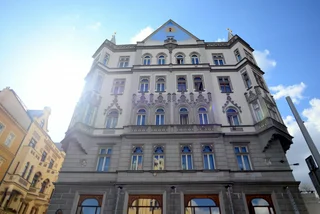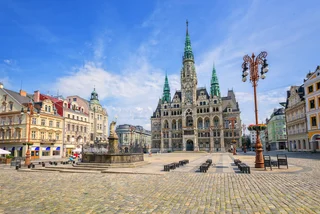Prague’s hotel market is the most affected by the coronavirus crisis of any city in Europe. In 2020, it recorded Europe’s largest decline in average room revenue, by 84.6 percent compared to the previous year, with an average annual room occupancy rate of 16.6 percent, according to data from Smith Travel Research analyzed by consultancy Cushman & Wakefield.
Only Barcelona, Rome, and Lisbon were similarly affected. The impact on other major hotel markets in Europe was slightly smaller, with an average decline in room revenue of 69.7 percent. The main reason for the decline in sales in Prague was a drop in occupancy by 78.5 percent as well as a decrease in average prices by 28.1 percent to EUR 66 per room.
PARTNER ARTICLE
Confidence in the long-term potential of the Prague hotel market is not declining. Analysts expect the market to return to pre-crisis levels between 2022 and ’24.
“Like most other major tourist destinations in Europe, Prague is dependent on international tourism, which in 2020 was significantly reduced by the effects of the coronavirus crisis. In Prague, however, the impact was greater, for two reasons,” Bořivoj Vokřínek, strategic consulting partner and head of research in the hotel real estate department for the EMEA region at Cushman & Wakefield, said.
“During the first wave, the Czech government was among the first to impose strict restrictions, including the forced closure of hotels. During the second wave after the summer, the Czech Republic recorded one of the highest increases in cases in Europe, which brought about a radical suspension of foreign tourism and the subsequent closure of hotels,” he added.
“In addition – in contrast to many other countries – the Czech authorities did not use the local hotels to accommodate paramedics or as temporary hospitals. All this has contributed to the fact that Prague is one of the most affected hotel markets in Europe. However, it should be borne in mind that these are temporary factors that are not directly related to the tourism market, and once the virus is under control, it should recover quickly.,” he said.
Visitors to Prague usually come to us as tourists from countries within Europe. In 2019 such recreational visits accounted for 73 percent of the total number of overnight stays. The market should recover relatively quickly after the measures are relaxed, even if travel from outside Europe remains difficult, according to Cushman & Wakefield.
In the summer months, when the measures were relaxed and at least tourists from the surrounding countries were able to travel to Prague again, the city’s hotels almost doubled occupancy from 9 percent to 17 percent in July, and over 22 percent in August. Prague quickly overtook international destinations such as London, Paris, or Rome.
Tourists’ interest in Prague is recognized by the main players in the hotel market. Both investors and hotel operators are waiting for opportunities to enter this market or expand their activities.
“Prague has long been of interest to all types of players in the hotel segment – and the coronavirus crisis does not seem to change that. Our capital has lasting values and strengths that steadily attract a very significant number of visitors, so as soon as it is possible again, there is no reason why the numbers of tourists should not return to pre-crisis levels,” David Nath, partner and hotel team leader for Central and Eastern Europe at Cushman & Wakefield, said.
“The willingness and desire to travel persists, and Prague remains the preferred destination. That is why we constantly see the interest of major companies in the field to buy, rent, or operate one of the local hotels – the demand in this direction clearly exceeds the supply,” he added.
The Czech market did not record many hotel transactions in 2020. Some were postponed due to the uncertainty caused by the crisis. Some potential hotel purchasers waited to see if prices would drop, but that did not occur.
“The excess of demand over supply keeps prices at their original level. There are many investors looking for an opportunity to buy a hotel in Prague and a small number of hotels for sale,” Nath said.
“The volume of planned construction is not significant either – in the next three years we expect an increase of 1,750 rooms, which represents only 1.5 percent of the average annual growth. There is also talk of limiting short-term rentals and reducing VAT on accommodation services,” he added.
“All this adds to the fact that the owners still believe that their hotels have the same value as in 2019. On the contrary, investors expected a drop of up to half. So we can count on a higher level of sales only when the ideas of both parties start to get closer,” he said.
Hotel operators expect to reach a market level similar to 2019 between 2022 and 2024, with the date varying depending on the importance and size of the destination. These estimates correspond to the forecast of Oxford Economics, according to which tourist demand in Prague is to recover by 2024, Cushman & Wakefield stated in their press release.
The crisis also affected the construction of new projects. Although most respondents said that all or most of them were proceeding according to plan, some projects were delayed or canceled.
In Prague, the increase in new hotel projects has been very limited for a long time, as was the case before the crisis. However, the construction of current local projects – such as the Hotel Andaz Prague on Senovážné náměstí or the conversion of the Evropa Hotel on Wenceslas Square into a luxury W Hotels venue – continues uninterrupted.
“Of course, the Prague hotel market is facing challenges, and it is difficult to secure funding now. However, this is definitely not impossible: recently, for example, we managed to arrange refinancing for a large five-star hotel in the center of Prague,” Nath said.












 Reading time: 4 minutes
Reading time: 4 minutes 





























